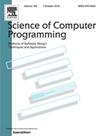弱记忆模型 PSO 和 SRA 的基于视图的公理推理
IF 1.4
4区 计算机科学
Q3 COMPUTER SCIENCE, SOFTWARE ENGINEERING
引用次数: 0
摘要
弱内存模型描述了现代多核架构中并发程序的语义。由于这些语义偏离了通常假定的顺序一致性模型,推理技术(如 Owicki-Gries 式的证明计算)需要适应特定的内存模型。为了避免为每一种新的内存模型设计新的证明计算,最近提出了一种公理推理的统一方法。这种方法基于独立于内存模型的公理进行推理,这些公理涉及线程视图以及它们如何被读写等程序动作所改变。它允许仅根据公理来证明程序的正确性。在本文中,我们研究了部分存储顺序(PSO)和强释放获取(SRA)模型这两种内存模型的公理实例。我们发现,这两个模型都符合所有公理,只有一个公理不符合。对于 PSO,缺失的公理指的是内存模型的消息传递能力;对于 SRA,缺失的公理指的是执行线程上操作的独立性。我们将讨论这些缺失公理的后果,并在一个特定的试金石测试中说明推理技术。本文章由计算机程序翻译,如有差异,请以英文原文为准。
View-based axiomatic reasoning for the weak memory models PSO and SRA
Weak memory models describe the semantics of concurrent programs in modern multicore architectures. As these semantics deviate from the commonly assumed model of sequential consistency, reasoning techniques like Owicki-Gries-style proof calculi need to be adapted to specific memory models. To avoid having to design a new proof calculus for every new memory model, a uniform approach for axiomatic reasoning has recently been proposed. This approach bases reasoning on memory-model independent axioms about thread views and how they are changed by program actions like reads and writes. It allows to prove program correctness based on axioms only. Such proofs are valid for all memory models instantiating the axioms.
In this paper, we study instantiations of the axioms for two memory models, the Partial Store Order (PSO) and the Strong Release Acquire (SRA) model. We see that both models fulfil all but one axiom, a different one though. For PSO, the missing axiom refers to message-passing abilities of memory models; for SRA, the missing axiom refers to the independence of actions on executing threads. We discuss the consequences of these missing axioms and illustrate the reasoning technique on a specific litmus test.
求助全文
通过发布文献求助,成功后即可免费获取论文全文。
去求助
来源期刊

Science of Computer Programming
工程技术-计算机:软件工程
CiteScore
3.80
自引率
0.00%
发文量
76
审稿时长
67 days
期刊介绍:
Science of Computer Programming is dedicated to the distribution of research results in the areas of software systems development, use and maintenance, including the software aspects of hardware design.
The journal has a wide scope ranging from the many facets of methodological foundations to the details of technical issues andthe aspects of industrial practice.
The subjects of interest to SCP cover the entire spectrum of methods for the entire life cycle of software systems, including
• Requirements, specification, design, validation, verification, coding, testing, maintenance, metrics and renovation of software;
• Design, implementation and evaluation of programming languages;
• Programming environments, development tools, visualisation and animation;
• Management of the development process;
• Human factors in software, software for social interaction, software for social computing;
• Cyber physical systems, and software for the interaction between the physical and the machine;
• Software aspects of infrastructure services, system administration, and network management.
 求助内容:
求助内容: 应助结果提醒方式:
应助结果提醒方式:


